
Rice scientists use electrons to pattern light sources and wiring directly onto crystals
Rice researchers used a focused electron beam to pattern device functions with submicron precision directly into an ultrathin crystal.

Rice scientists use electrons to pattern light sources and wiring directly onto crystals
Rice researchers used a focused electron beam to pattern device functions with submicron precision directly into an ultrathin crystal.

Wrinkles in atomically thin materials unlock ultraefficient electronics
Rice scientists have discovered that tiny creases in two-dimensional materials can control electrons’ spin with record precision, opening the path to ultracompact, energy-efficient devices.
Rice scientists pioneer transfer-free method to grow ultrathin semiconductors on electronics
A team of materials scientists at Rice has developed a new way to grow ultrathin semiconductors directly onto electronic components.

Rising stars in quantum materials convene at Rice Global Paris Center for international workshop
Some of the brightest early career researchers in quantum materials met at the Rice Global Paris Center.

Scientists find new quantum behavior in unusual superconducting material
Researchers have discovered direct evidence of active flat electronic bands in a kagome superconductor.

Ripples of the future: Rice researchers unlock powerful form of quantum interference
Rice researchers have demonstrated a form of quantum interference two orders of magnitude greater than any previously reported.
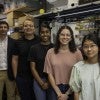
Rice scientists discover way to engineer stronger soft devices through smarter silicone bonding
In a step forward for soft robotics and biomedical devices, Rice engineers have uncovered a powerful new way to boost the strength and durability of silicone-based soft devices without changing the materials themselves.

Physicists unlock hidden order in twisted graphene, paving way for supermoiré engineering
A new study by applied physicists used a custom-designed microscope to examine supermoiré patterns in trilayer graphene.
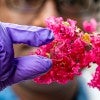
New coating for glass promises energy-saving windows
A new coating for glass developed by Rice researchers and collaborators could help reduce energy bills, especially during the cold season, by preventing heat-loss from leaky windows.
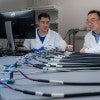
Thick electrodes’ chemistry matters more than structure for battery performance
Rice researchers showed that even if the materials used in thick battery electrodes have nearly identical structures, their internal chemistry impacts energy flow and performance differently.
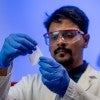
Rice researchers develop superstrong, eco-friendly materials from bacteria
Scientists at Rice and University of Houston have developed an innovative, scalable approach to engineer bacterial cellulose into high-strength, multifunctional materials.

Near-perfect defects in 2D material could serve as quantum bits
Researchers at Rice and collaborators at Oak Ridge National Laboratory and the University of Technology, Sydney report the first demonstration of low noise, room-temperature quantum emitters in h-BN made through a scalable growth technique.
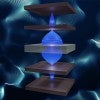
Rice scientists harness vacuum fluctuations to engineer quantum materials
Rice researchers and collaborators have developed a new cavity design that selectively enhances the quantum vacuum fluctuations of circularly polarized light in a single direction, achieving chirality — a feat that typically requires the use of a strong magnetic field.

‘Here to work with the world’: Rice shines at inaugural SXSW London
Rice took center stage at the inaugural South by Southwest London, bringing Texas-sized ambition, pathbreaking innovation and global vision to one of the world’s premier gatherings of creative and intellectual leaders.

Xie recognized for innovation in quantum phenomena
Rice's Yonglong Xie has been recognized for his innovation in quantum phenomena.